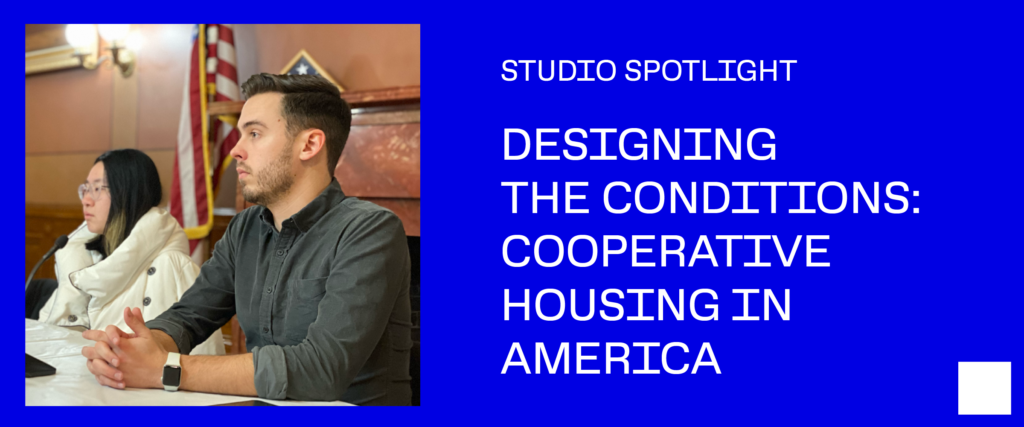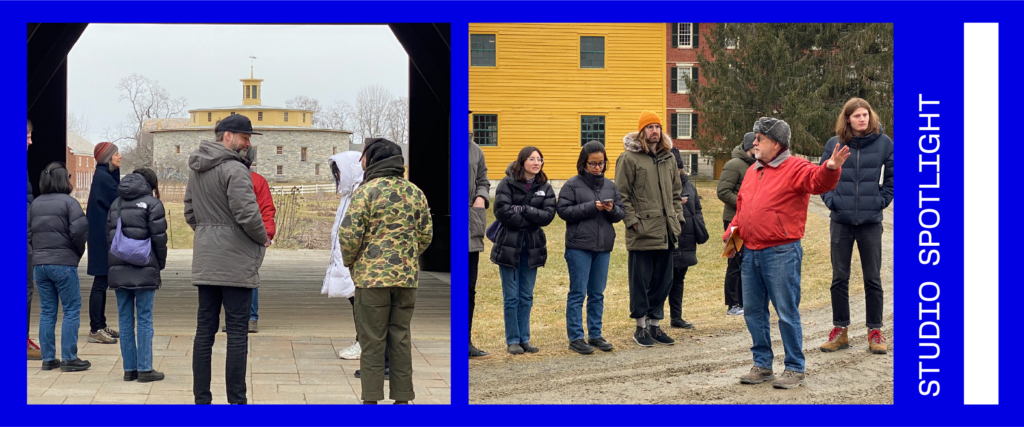Studio Spotlight: Cooperative Housing in America

“Going to Central Falls and talking to people on the ground reveals things about the way that people live and use space that you wouldn’t be able to learn elsewhere.”
– Gianina Yumul MUP ’23
Central Falls, Rhode Island is small both in terms of its geography and population, and its buildings aren’t particularly renowned for their design; it’s not the first location that comes to mind for architecture, urban planning, and urban design students to visit. Yet Central Falls is home to a deeply diverse community, creating unique needs for housing and housing policies that address lifestyles across the five different languages commonly spoken in the area. Led by Design Critic Susanne Schindler, the 2023 GSD option studio “Designing the Conditions: Cooperative Housing in America” granted students the opportunity to work with the Central Falls community and its municipal staff to explore paths to affordable housing.
Being in Central Falls and meeting with key officials helped urban planning student Gianina Yumul MUP ’23 realize what would become the focal point of her research.
Gianina: “It was when I went to Central Falls and met the mayor and the planning director that everything clicked. I got a real sense of the city’s needs and how tight their budget was. That visit really got me thinking about my studio project in a whole new way; I wanted to come up with something that made sense for a financially constrained—but ambitious—place like Central Falls. That’s when I really got into service design, which became my main focus.”
The option studio allowed students a chance to take abstract ideas on housing and further develop them in a real-world environment, ideating alongside local planners who are already taking steps to solve housing issues. Central Falls’s Director of Planning and Economic Development Jim Vandermillen worked directly with the GSD students, giving them a sense of the real-world constraints of time and funding as well as the process of designing and advocating for new ideas within them.
Jim: “We weren’t approaching the GSD students as a client, saying, ‘This is what we want you to do.’ They were able to explore issues and matters interesting to them. But more than that, it was a resource for us. Hearing their [end-of-semester] presentations helped me gain a new perspective on the challenges facing Central Falls.”
In the Rhode Island studio, students were part of a deeply immersive experience only an hour’s drive from Cambridge. While the students had studied other New England cities and reviewed abundant data before visiting Central Falls, they deepened their knowledge of the community by simply walking its streets. The number of mailboxes or satellite dishes attached to a home gave a near-instant telling of the story of a Central Falls resident beyond what could be gleaned from data. The Option Studio Fund exists to reduce funding barriers and allow access to these sorts of insights, which landscape architecture and urban planning student Jeb Polstein MLA ’23, MUP ’23 found invaluable.
Jeb: “I’ve gone through almost two years of COVID graduate school. So I’ve gotten pretty good at trying to understand a place using Google Earth. But you get a totally different sense of a place by visiting there. And the more surprising characteristics you get to experience—the vegetation, decay of the bricks, microclimates—it’s all pretty irreplaceable.”

Students looked to communities domestic and abroad as part of their research, citing programs and policies from cities such as Zurich, Switzerland; Burlington, Vermont; Minneapolis, Minnesota; and Washington, DC. Students leveraged their backgrounds in planning and design, as well as their own lived experiences both locally and abroad, in order to design nonprofit cooperative housing proposals specific to Central Falls.
In their final presentation, students worked collaboratively to join their proposals together into a cohesive narrative, one that tells the story of a city working to reframe the very foundation of housing. From physically altering spaces for future flexibility to policies that incentivize the use of vacant buildings, students offered ideas that Central Falls planners and residents can use to advance housing that will be both desirable and affordable in the long term.
This collaborative approach not only widened their perspectives, but also allowed these students to build unique interdisciplinary skill sets that they will take with them as they continue contributing to the future of housing communities around the globe.
Gianina: “Within the different programs at the GSD, we take some of the same classes, but aren’t asked to collaborate that often. In this studio, I was collaborating with people I might not have worked with, and it was incredibly rewarding. It was an exchange of skill sets and ideas that I hadn’t experienced between planners and designers.”
The Design Studio Fund ensures that GSD students have the chance to apply their learning at the intersection of theory and practice by defraying option studio costs. These engaging educational experiences are made possible, in part, through annual giving.
Learn more about annual giving and its impact at the GSD here.
